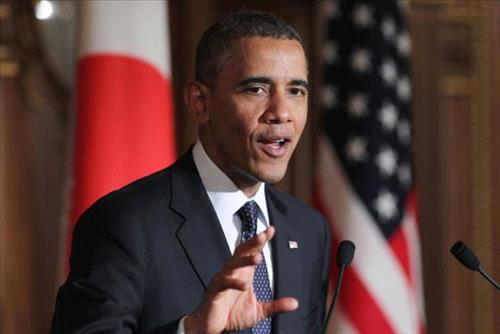Ammon News - (Reuters) - U.S. President Barack Obama said on Friday a "pause" might be needed in U.S.-brokered peace talks between Israel and the Palestinians, suggesting leaders on both sides lacked the will to make the necessary compromises.
Israel on Thursday suspended participation in negotiations with the Palestinians in response to President Mahmoud Abbas's unexpected unity pact with the rival Islamist Hamas group, which Israel and the United States consider a terrorist organization.
Speaking at a news conference in Seoul, Obama called the Palestinian move "unhelpful" and said it was one of a series of choices the two sides had made in recent weeks that had hurt the chances of reaching a peace deal.
"There may come a point at which there just needs to be a pause and both sides need to look at the alternatives," Obama said, offering a grim assessment of nine months of direct talks that were overseen by Washington but ultimately led nowhere.
While Obama insisted he was not ready to abandon his quest for Middle East peace, he said: "What we haven't seen is, frankly, the kind of political will to actually make tough decisions, and that's been true on both sides."
There was no immediate reaction from leaders in Israel or the Palestinian Territories, who have blamed each other for the latest in a string of failed peace efforts.
Obama was careful not to apportion blame and left open the hope that one day the respective camps would overcome their mutual distrust and walk through what he said was the only door available to them to end their generations-old conflict.
"We will continue to encourage them to walk through that door. Do I expect that they will walk through that door next week, next month, or even in the course of the next six months? No," he said.
CRITICISM
U.S. Secretary of State John Kerry has invested considerable time and political capital in the talks, visiting the Middle East more than a dozen times in a year to try to narrow the yawning divide that separates Israeli and Palestinians.
The stalemate represents a blow to him at a time when the United States, Israel's closest ally, has faced fierce criticism from friend and foe alike over its handling of Middle East problems such as Syria's civil war, nuclear talks with Iran and Egypt's upheavals.
Obama acknowledged on Friday that achieving an Israeli-Palestinian peace deal - a goal that has eluded many previous U.S. presidents - had always been a "long shot" for his administration, which failed in a first-term peace initiative.
But he said it was in U.S. interests to end a dispute that was "combustible".
The negotiations struggled almost as soon as they started last July, with the Palestinians enraged by a wave of new Jewish settlement building on land they envisage as part of a future state, and Kerry had been struggling to convince the bitter foes to extend the talks beyond an original April 29 deadline.
Israeli Prime Minister Benjamin Netanyahu said on Thursday he would not sanction discussions with Palestinian President Mahmoud Abbas at a time when he was looking to form a unity government with militant group Hamas, which governs Gaza.
Previous efforts to end the seven-year schism have imploded and there was no indication that Abbas would succeed this time around, meaning that although the direct peace talks are in a coma, they are not necessarily dead.
The Palestinians argue that just as Netanyahu has parties in his coalition that are fiercely opposed to the creation of an independent Palestine, so Abbas can forge a pact with a group that does not recognize Israel's right to exist.
